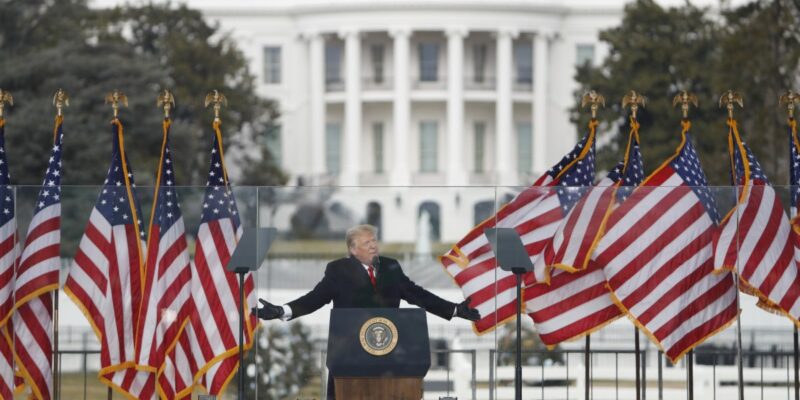
Special Counsel Jack Smith filed a new indictment of Donald Trump on Tuesday that leaves in place the same criminal charges—even as it narrows the underlying allegations—in response to the Supreme Court’s widely decried decision declaring that presidents’ official actions are immune from prosecution.
Trump is still charged with conspiring to defraud the United States, conspiring to obstruct an official proceeding, obstructing an official proceeding, and conspiring to deprive people of their civil rights. The charges relate to Trump’s bid to retain power after his 2020 election defeat.
But the new 36-page indictment drops a section that detailed Trump’s efforts to pressure the Justice Department to support his false claims of election fraud. It also no longer cites an unnamed official—who was easily identified as Jeffrey Clark, a former Trump loyalist in the Justice Department—among unindicted co-conspirators who assisted with Trump’s plot.
The superseding indictment also still includes allegations that Trump attempted to pressure then–Vice President Mike Pence to refuse to carry out his ceremonial role in certifying the electoral vote count. That section remains even though Chief Justice John Roberts wrote in the court’s immunity ruling that Trump’s interactions with Pence were official conduct for which “Trump is at least presumptively immune from prosecution.” Roberts, with little specificity, said the government would have to rebut “that presumption of immunity.”
The filing comes a day after Smith filed an appeal asking a federal circuit court to reverse a decision by US District Judge Aileen Cannon, a Trump appointee who has appeared eager to defer to the former president’s claims, throwing out Smith’s criminal charges against Trump over his efforts to avoid complying with a federal subpoena seeking the return of classified government documents Trump removed from the White House when he left office. Breaking with decades of legal precedent, Cannon ruled that Smith was not lawfully appointed as special counsel.
Those two rulings handed Trump major legal victories and created the appearance that conservative judges were eager to use their power to protect Trump from prosecution he has claimed is politically motivated.
In his appeal and the new indictment restating the same charges against Trump, Smith appears, within the bounds of the law, to be standing by the charges his office has leveled at Trump in a bid to hold former president responsible for his alleged crimes.
The new indictment comes 10 days before a Justice Department policy that bars charges within 60 days of an election, which would have effectively blocked Smith from issuing charges against Trump as he seeks reelection.
Smith, of course, will not determine what charges remain against Trump. The judge overseeing the January 6 case, Tanya Chutkan, will begin making that determination, using a test the Supreme Court vaguely outlined, at a hearing next week.
Trump is awaiting sentencing following his May conviction in New York of 34 felony counts of falsifying business records to hide payments aimed at covering up a sexual affair with porn actress Stormy Daniels. He also faces criminal charges in Georgia related to his efforts to subvert his election defeat there in 2020.
In the two federal cases brought by Smith, Trump is widely expected to order the Justice Department to drop charges against him, or to pardon himself, if he wins reelection—though either act would be an unprecedented case of a president decreeing his own imperviousness to criminal charges.
Smith’s recent moves, however, make it clear that Trump remains in jeopardy. If Vice President Kamala Harris prevails in November, Trump faces n0t only another defeat but fair odds, sooner or later, of a federal conviction.















